The "Zyprexa Documents" were released from legal discovery and posted at Furious Seasons in 2007. This slide is from an Eli Lilly 1994 "Life Plan" for Zyprexa. It pretty much summarizes the state of excitement from those salad days of the mid-1990s. Clozapine was the gold standard for Efficacy, but flunked Safety. The manufacturers of the coming Atypical Antipsychotics saw a window of opportunity to have Clozapine Efficacy without the Toxicity of either Clozapine or the older Neuroleptics. We all wanted that. Who wouldn’t? They were positioning themselves for that market. Who would take the prize?
 By 2001 [the year Lilly‘s Prozac patent expired] they were getting more grandiose [see right]. Succeeding with Zyprexa was at the level of the fate of Western Civilization, at least at Lilly headquarters. And by then, Seroquel had arrived and Geodon was just being approved. Becoming Masters of the Universe wasn’t going to be so easy.
By 2001 [the year Lilly‘s Prozac patent expired] they were getting more grandiose [see right]. Succeeding with Zyprexa was at the level of the fate of Western Civilization, at least at Lilly headquarters. And by then, Seroquel had arrived and Geodon was just being approved. Becoming Masters of the Universe wasn’t going to be so easy.
One strategy was to get the Psychiatrists out of the equation and have Primary Care Physicians treating the mentally ill. So they developed a Primary Care Resource Guide to make Primary Care Physicians more comfortable treating the symptoms of mental illness. Here’s a sample way to approach the doctors:
The key to their strategy was to reduce mental illness to a simple set of symptoms and behaviors:
The next step was even simpler: the treatment for those symptoms and behaviors was always the same – Zyprexa. I guess one way to sell more Zyprexa was to eliminate Psychiatry altogether since there are so many more Primary Care Physicians – a bold move on Lilly‘s part:
But Psychiatry wasn’t Lilly‘s only target with Zyprexa. They had adding a few diseases to their indications in mind as well [from a 1997 presentation]:
 These documents are archived at Furious Seasons and Zyprexa Litigation Documents, [erratic access] and there are a lot of them. But they’re overwhelming in dimensions other than just their sheer numbers. There’s an arrogance and a grandiosity behind the power-point slides and the strategies that seems like something out of an overwritten summer beach novel about corporate greed. Not only did they envision reducing mental illness to a symptom list and eliminating Psychiatry from the treatment loop, they also had designs on including the full gamut of mental disorders in their indication profile.
These documents are archived at Furious Seasons and Zyprexa Litigation Documents, [erratic access] and there are a lot of them. But they’re overwhelming in dimensions other than just their sheer numbers. There’s an arrogance and a grandiosity behind the power-point slides and the strategies that seems like something out of an overwritten summer beach novel about corporate greed. Not only did they envision reducing mental illness to a symptom list and eliminating Psychiatry from the treatment loop, they also had designs on including the full gamut of mental disorders in their indication profile.
Lilly had already had a neuroscience blockbuster [Prozac]. If you go to the Prozac site now, there’s nothing there but warnings [you’d think they might’ve learned something from that experience]. But that’s not what happened. Instead, Lilly was out to make history again. Maybe they played it straight in the FDA approval process like I said, but there were other forces operative at Lilly headquarters early on to pull out all the stops right out of the gate. But unfortunately for Lilly and their customers, Zyprexa was "Colzapine-like" in more ways than they planned:
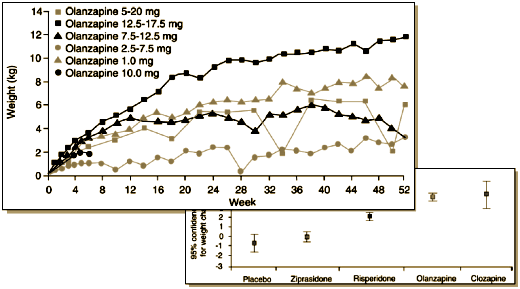
Even before the risk of Diabetes became apparent, the literature began to fill up with reports of substantial weight gain on Zyprexa. The "Zyprexa documents" contain a lot of threads. There’s Lilly‘s attempt to manipulate the practice of medicine with ghostwritten articles, kol speaker venues, and continuing medical education programs; there’s their program to induce general practitioners to treat major psychiatric syndromes as "symptoms" and not refer patients to psychiatrists; there were persistent attempts to obfuscate the impact of weight gain and diabetes resulting from their product; and there’s a corrupt corporate culture that rivals that of the Derivative Traders that decimated our economy.
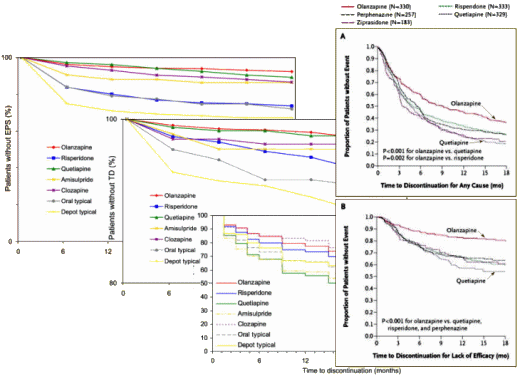
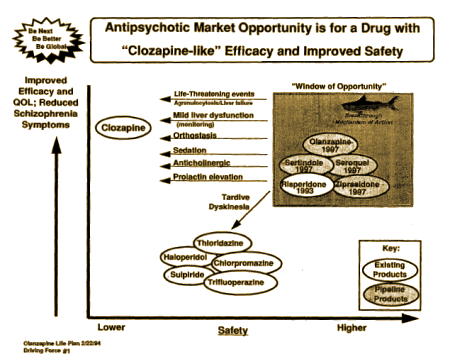

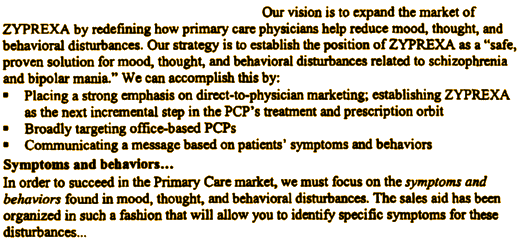

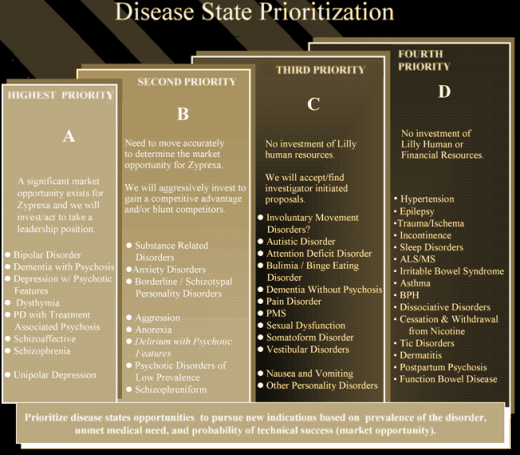
Since you are going through the laundry list of Pharmaceutical Corporate con games with atypical anti-psychotics…you might as well ad Risperdal into the mix.
From the evidence being presented here and from others..one must conclude that the pharmaceutical Industry continues to run a vast criminal racketeering operation. They definitely have all their bases well covered; from the oval office to advocacy organizations and with everything in-between.
Without what is paramount to a revolution, I can’t see where much is changing anytime soon..I fear this will just have to play out with all the horrendous human cost & toll; before it collapses in on itself. Only a matter of historically measured time for this barbaric pillaging business model to show how unsustainable it really is..
http://www.bnet.com/blog/drug-business/internal-j-j-emails-detail-8220ugly-8221-chapter-in-mismarketing-of-antipsychotics/7743?utm_source=twitterfeed&utm_medium=twitter
the question in my mind is how come there are so a few voices in psychiatry
the only voices i hear are those of of “a boring old man”, daniel carlatt and david healy
the amount of monies spent on the “new antipsychotics” and the new antidepressants is enormous
stan,
Yikes. I hadn’t seen the Risperdal article. What were they thinking?
The link Obesity->Diabetes is farfetched. The simple fact that they are comorbid doesn’t necessary imply one leads to the other. In fact afiak adiponectin (produced by fatcells) protects against diabetes type 2.
As for the weightgain itself…. It’s hard to tell were it stems from. Sure when taking Zyprexa (my wife eats it by the handful) appetite increases.
But is this caused by a direct effect of the medication, or is it caused by the simple fact of feeling better one enjoys life’s niceties more?
I wouldn’t know how to test reliably for that. Anecdotally my wife eats better because she feels better.